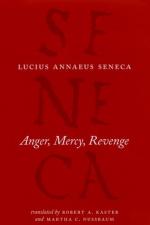|
This section contains 6,535 words (approx. 22 pages at 300 words per page) |

|
SOURCE: "Seneca in Elizabethan Translation," in Selected Essays, Harcourt, Brace Jovanovich, Inc., 1950, pp. 51-88.
Perhaps the most influential poet and critic to write in the English language during the first half of the twentieth century, Eliot is closely identified with many of the qualities denoted by the term Modernism: experimentation, formal complexity, artistic and intellectual eclecticism, and a classicist's view of the artist working at an emotional distance from his or her creation. The following essay was originally published in 1927 as an introduction to the Tudor Translation Series edition of Thomas Newton's 1581 rendering of Seneca's plays, entitled Tenne Tragedies. Eliot focuses on Seneca's effect on the development of the Elizabethan Tragedy of Blood, his impact on the dramatic language of the period, and his influence on the intellectual ideas contained in the plays of William Shakespeare, Ben Jonson, Thomas Kyd, and others.
The influence of Seneca upon Elizabethan...
|
This section contains 6,535 words (approx. 22 pages at 300 words per page) |

|


